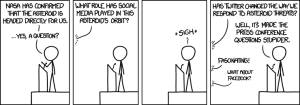Before posting some mid-Thursday afternoon linkage, here is a little musing on not overstating the influence of social media on entertainment and politics. For a moment this week, the horribleness that was the SyFy Channel’s Sharknado set off a mini-Twitter storm that resulted in: a bunch of tweets but still dismal ratings for the made for TV movie. This reminded me of the fleeting victory in Texas for supporters of abortion rights: while State Senator Wendy Davis’ filibuster scored 200,000 live-stream viewers on the Texas Tribune website and netted her $1 million for a future gubernatorial run, abortion opponents ultimately won the day: the legislation passed. Besides, her prospective opponent has $20 million in the bank for his campaign. Apropos of those observations: Dan Drezner captioned this cartoon:
Somewhere, @evgenymorozov is smiling: https://t.co/Sq9WLTOnIP
— Daniel Drezner (@dandrezner) July 17, 2013
I’m going to stick with a media-focused set of links this week with clips of two recent movies that maybe didn’t change the world but documented a changed world, namely the movie No, about the successful ad-driven campaign to defeat the plebiscite to validate and extend Pinochet’s rule in the 1980s. I’ve also got a link to the movie The Gatekeepers, the fabulous 2012 Israel documentary featuring interviews with 6 surviving heads of Shin Bet, the country’s internal security service. While the movie may overstate the role played by advertising (see this article in the Atlantic), it was an effective portrait of how a social movement could topple a dictator. The interesting question is what made Pinochet feel vulnerable to international pressure to carry out a plebscite in the first place and then respect the results:
The Gatekeepers (New Yorker review here) for its part features interviews with six surviving former heads of Shin Bet, Israel’s internal security service. The damning conclusion of these interviews, with men who knows the dynamics of the occupation very, very well, is that Israel’s actions vis a vis the Palestinians are, in their words, cruel and ineffective, that a permanent peace was fleetingly possible in era of Rabin before he was assassinated by a right-wing Israeli extremist. As one of the protagonists Ami Ayalon noted, the future may be bleak because “most Israelis are not listening.”
Joshua Busby is a Professor in the LBJ School of Public Affairs at the University of Texas-Austin. From 2021-2023, he served as a Senior Advisor for Climate at the U.S. Department of Defense. His most recent book is States and Nature: The Effects of Climate Change on Security (Cambridge, 2023). He is also the author of Moral Movements and Foreign Policy (Cambridge, 2010) and the co-author, with Ethan Kapstein, of AIDS Drugs for All: Social Movements and Market Transformations (Cambridge, 2013). His main research interests include transnational advocacy and social movements, international security and climate change, global public health and HIV/ AIDS, energy and environmental policy, and U.S. foreign policy.



With regard to “No.”
https://foreignpolicyblogs.com/2013/04/09/no-the-rest-of-the-story/